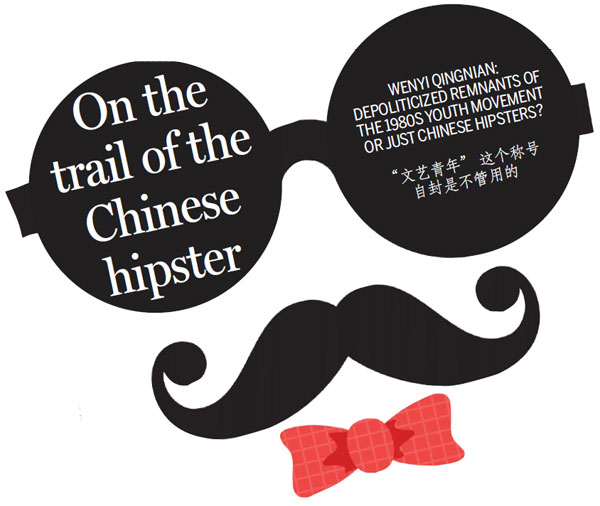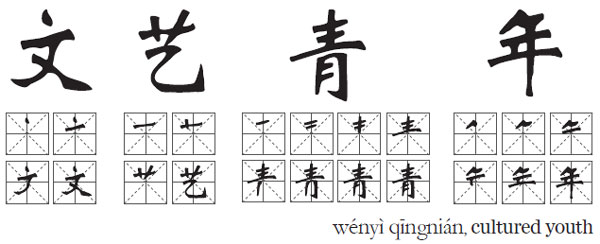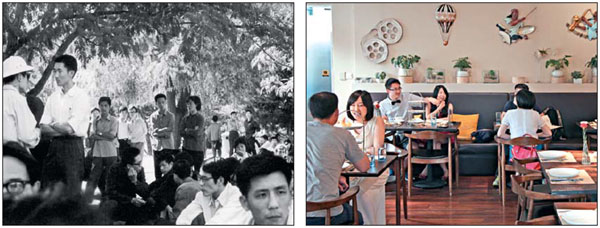On the trail of the Chinese hipster
Updated: 2015-04-03 07:32
By David Dawson(China Daily Europe)
|
|||||||||||
Wenyi qingnian: Depoliticized remnants of the 1980s youth movement or just Chinese hipsters?
"文艺青年" 这个称号自封是不管用的
You see them around China's first-tier cities: young, often fashionable but sometimes decidedly anti-fashion, lounging in cafes, tapping away on their mobile devices, perhaps strumming a guitar. Not so engrossed in the online world as the otaku youth who become lost in the Byzantine subcultures of anime and online games, eventually losing their ability to socialize with the opposite sex, nor are they quite as reviled as the tuhao nouveau riche -although they, too, are criticized when attempts at sophistication go awry.
They are the wenyi qingnian (文艺青年), or cultured youth. Some have called them the Chinese hipster, and like its Western counterpart, it can be used as a slur, but in China it really depends who you ask. Everybody and nobody knows how to define them, but they are most certainly a modern subculture -or perhaps the resurrected, de-politicized version of an older one.


|
Left: Wenxue qingnian, or literary youth, discussing poetry one summer day in 1979 in Zizhuyuan Park in Beijing. Right: Wenyi qingnian enjoy tea on a Sunday afternoon in Shanghai. Photos provided to China Daily |
They are into literature, poetry and music. They strive to be different. They are trendy, possibly environmentally conscious. They occasionally embrace the label, but are often hesitant about doing so. Part of the reason is that the term has become so overused that a backlash was bound to occur. After all, if you go around calling yourself a "cultured youth" don't be surprised when the oh-so-chinglishy-but-ironically-hip term zhuang, which has a similar meaning to poser/pretender, gets leveled at you.
But despite the surface similarities, there are some significant differences between wenyi qingnian, or wenqing (文青), and the hipsters of the West.
When asked how to define wenqing, one 22-year-old Chinese student, who likes to go by her Japanese name Yuki, says the term is used so broadly that it covers a variety of niche groups.
"You can use the word in many ways. It can be negative. You can use it to describe a guy who plays guitar but is mostly doing it to get girls," she says, adding that it is also used to describe people who are genuinely interested in the latest cultural trends.
She says similarities with a previous youth movement, the wenxue qingnian (文学青年). These were the literary youth of the 1980s who became enamored with poetry.
Wenyi qingnian has only really become a popular term in the past four years or so. But, it seems almost certain that they occupy the same niche in society -the well-educated youth, interested in culture. But it would seem that the wenqing have been de-politicized and instead focus on cultural pursuits, to the exclusion of the political.
Contrast this with the origins of the Western hipster, who first emerged out of the 1940s jazz scene. Far from the outraged, idealistic wenxue qingnian, the original Western hipsters (who were hipsters before it was uncool) also defined themselves by their familiarity with emerging cultural trends but did so with a more jaded eye. They did not attempt such things as changing society or even defining themselves, rather, they sought to distance themselves entirely from mainstream society, rather than reforming it, to stay ahead of the "squares".
The modern hipsters may have ditched much of the jazz background, but maintained their aloof presence and desire to remain apart from society, along with their focus on the latest cultural trends. It is here that the wenqing and hipsters manage to converge.
When asked to describe wenqing with a word, Yuki goes for "sentimental".
Literature is a fairly common thread that runs through discussions of wenqing. In order to be considered cultured, one must be on good terms with the written word, be it as a consumer or creator. Websites such as Qidian.com are a popular haunt, allowing writers the chance to post their pieces, often "sentimental" love stories, and receive exposure based on the number of clicks they receive. Some have gone on to make book deals and achieve success.
It is not just sentimental romance tales that draw interest. Critically acclaimed works in any genre are likely to crop up in wenqing discussions, with recent successes like the science fiction novel The Three-Body Problem by Liu Cixin in vogue as well as Jia Zhangke's film A Touch of Sin -notable in the West for its nomination for the Palme d'Or at the Cannes Film Festival but has not been able to get a broadcast license in China. Previous darlings of the Chinese film establishment, such as Zhang Yimou and Feng Xiaogang, would appear to have had too much mainstream success to warrant much attention from those striving to differentiate themselves based on culture.
And no doubt, as time passes, the cultural touchstones that define the current crop of wenqing will fade to be replaced by the latest cultural sensation.
Wenqing are not immune to this. All too quickly, they can be accused of being "2B qingnian" (二逼青年) who are essentially uncultured idiots.
But in the fast-paced world of online subcultures, any term can become a criticism, and any term can be worn as a badge of honor. Much like the diaosi (屌丝) dregs of society, some 2B qingnian may wear the term with pride -often due to the same desire to stand apart from the masses, which is not so very different from the more sophisticated (though admittedly this is in the eye of the beholder) attempts by the wenqing.
Perhaps the overall lesson from it all is that calling yourself a "cultured youth" unsurprisingly can result in criticism. Being cultured enough to have someone else call you one can be nice, but you might want to double-check the praise is genuine.
Courtesy of The World of Chinese, www.theworldofchinese.com
The World of Chinese
(China Daily European Weekly 04/03/2015 page27)
Today's Top News
54 dead after Russian trawler sinks in ocean
Death toll rises to 147 in Kenya university attack
Dozens killed in Kenyan university attack
Video of final seconds aboard Germanwings plane discovered
British Prince Harry reports for duty in Australia next week
Chinese World War II veterans to receive medals from Russia
Lufthansa insurers set aside $300 mln over crash
Sarkozy makes political comeback
Hot Topics
Lunar probe , China growth forecasts, Emission rules get tougher, China seen through 'colored lens', International board,
Editor's Picks

|

|

|

|

|

|







